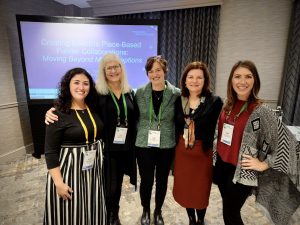Jackie Gifuni-Koutsouris, PfH Program and Evaluation Officer, was one of the session leads for a workshop, Move Beyond Misconceptions to Create Effective Place-Based Funder Collaborations, which was presented at the Exponent Philanthropy Conference in Minneapolis, MN on October 12. Kathy Smith, PfH Program Director, also served as a panelist. More than 50 conference attendees registered for this 2.5-hour session, with the session reaching full capacity.
The session focused on what’s worked, lessons learned, and how collaboration has strengthened the work and extended the reach of the Montclair Funders, and the Frederick County, Maryland Funders group. Session attendees reimagined when, why, and how lean funders might collaborate. They also learned ways to harness different kinds of expertise around a collaborative table to share data, better coordinate funding, identify gaps and unmet needs in the community, and tackle issues at the systems level. This collaborative session was extremely well received, with several attendees thanking session speakers for this work.
Learn more about the Session and Panelists below:
Move Beyond Misconceptions to Create Effective Place-Based Funder Collaborations
Session Leads: Leigh Adams, MBA, Executive Director, Ausherman Family Foundation; Jacqueline Gifuni-Koutsouris, MPH, MCHES, Program and Evaluation Officer, PFH
Panelists/Speakers:Lori Heninger, Ph.D., Executive Director, Montclair Fund for Women; Kathleen Smith, MA, Program Director, PFH; Lucy Vandenberg, MSW, Executive Director, Schumann Fund for New Jersey
Learning Objectives:
• Engage in ways to scan the landscape to identify potential collaboration partners and discover tactics to begin or deepen collaboration with other funders to catalyze change and advance equity
• Recognize how the cornerstone of collaboration is taking time to build relationships and trust among partners and learn ways to nurture these bonds
• Come away with a deeper understanding how funder collaboration has the power to elevate grantmaking activity in a community through a commitment to shared learning, investing in collective data, and looking at prevention and root causes instead of symptoms

